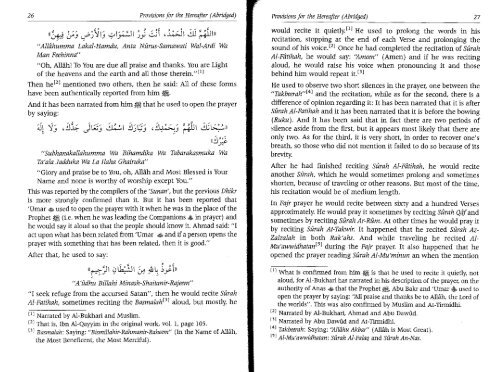Provisions for the Hereafter (Zaad Al-Ma'ad)
Provisions for the Hereafter (Zaad Al-Ma'ad)
Provisions for the Hereafter (Zaad Al-Ma'ad)
You also want an ePaper? Increase the reach of your titles
YUMPU automatically turns print PDFs into web optimized ePapers that Google loves.
26 <strong>Provisions</strong> <strong>for</strong> <strong>the</strong> <strong>Hereafter</strong> (Abridged)<br />
« 5.16 u,b 3\16 4.4; - ' 11 j y, cs, -j.ii c,"@ fil»<br />
"<strong>Al</strong>lahumma Lakal-Hamdu, Anta Narus-Samawati Wal-Ardi Wa<br />
Man Feehinna"<br />
"Oh, <strong>Al</strong>lahl To You are due all praise and thanks. You are Light<br />
of <strong>the</strong> heavens and <strong>the</strong> earth and all those <strong>the</strong>rein." 1i1<br />
Then he [21 mentioned two o<strong>the</strong>rs, <strong>the</strong>n he said: <strong>Al</strong>l of <strong>the</strong>se <strong>for</strong>ms<br />
have been au<strong>the</strong>ntically reported from him a<br />
And it has been narrated from him that he used to open <strong>the</strong> prayer<br />
by saying:<br />
\ Ls" LL:24 I 2.3- . 9<br />
Laj6}}<br />
"Subhanakallahumma Wa Bihamdika Wa Tabarakasmuka Wa<br />
Ta'ala Jadduka Wa La &Ilia Ghairuka"<br />
"Glory and praise be to You oh, <strong>Al</strong>lah and Most Blessed is Your<br />
Name and none is worthy of worship except You."<br />
This was reported by <strong>the</strong> compilers of <strong>the</strong> 'Sunan', but <strong>the</strong> previous Dhikr<br />
is more strongly confirmed than it. But it has been reported that<br />
'Umar used to open <strong>the</strong> prayer with it when he was in <strong>the</strong> place of <strong>the</strong><br />
Prophet (i.e. when he was leading <strong>the</strong> Companions 4, in prayer) and<br />
he would say it aloud so that <strong>the</strong> people should know it. Ahmad said: "I<br />
act upon what has been related from 'Umar and if a person opens <strong>the</strong><br />
prayer with something that has been related, <strong>the</strong>n it is good."<br />
After that, he used to say:<br />
"A'adhu Billahi Minash-Shaitanir-Rajeem"<br />
"I seek refuge from <strong>the</strong> accursed Satan", <strong>the</strong>n he would recite Sarah<br />
<strong>Al</strong>-Fatihah, sometimes reciting <strong>the</strong> Basmalah 131 aloud, but mostly, he<br />
[1] Narrated by <strong>Al</strong>-Bukhari and Muslim.<br />
[21 That is, Ibn <strong>Al</strong>-Qayyim in <strong>the</strong> original work, vol. 1, page 105.<br />
131 Basmalah: Saying: "Bismillahir-Rahmanir-Raheem" (In <strong>the</strong> Name of <strong>Al</strong>lah,<br />
<strong>the</strong> Most Beneficent, <strong>the</strong> Most Merciful).<br />
<strong>Provisions</strong> <strong>for</strong> <strong>the</strong> <strong>Hereafter</strong> (Abridged) 27<br />
would recite it quietly. 11 He used to prolong <strong>the</strong> words in his<br />
recitation, stopping at <strong>the</strong> end of each Verse and prolonging <strong>the</strong><br />
sound of his voice.f 2I Once he had completed <strong>the</strong> recitation of Sarah<br />
,41-Fatihah, he would say: 'Ameen" (Amen) and if he was reciting<br />
aloud, he would raise his voice when pronouncing it and those<br />
behind him would repeat 11. 131<br />
He used to observe two short silences in <strong>the</strong> prayer, one between <strong>the</strong><br />
"Takbeerah' 441 and <strong>the</strong> recitation, while as <strong>for</strong> <strong>the</strong> second, <strong>the</strong>re is a<br />
difference of opinion regarding it: It has been narrated that it is after<br />
Sarah <strong>Al</strong>-Fatihah and it has been narrated that it is be<strong>for</strong>e <strong>the</strong> bowing<br />
(Ruku). And it has been said that in fact <strong>the</strong>re are two periods of<br />
silence aside from <strong>the</strong> first, but it appears most likely that <strong>the</strong>re are<br />
only two. As <strong>for</strong> <strong>the</strong> third, it is very short, in order to recover one's<br />
breath, so those who did not mention it failed to do so because of its<br />
brevity.<br />
After he had finished reciting Sarah <strong>Al</strong>-Fatihah, he would recite<br />
ano<strong>the</strong>r Sarah, which he would sometimes prolong and sometimes<br />
shorten, because of traveling or o<strong>the</strong>r reasons. But most of <strong>the</strong> time,<br />
his recitation would be of medium length.<br />
In Fajr prayer he would recite between sixty and a hundred Verses<br />
approximately. He would pray it sometimes by reciting Sarah Qaf and<br />
sometimes by reciting Sarah Ar-Ram. At o<strong>the</strong>r times he would pray it<br />
by reciting Sarah At-Takwir. It happened that he recited Sarah Az-<br />
Zalzalah in both Rak'ahs. And while traveling he recited <strong>Al</strong>-<br />
Mu'awwidhatan [51 during <strong>the</strong> Fajr prayer. It also happened that he<br />
opened <strong>the</strong> prayer reading Sarah <strong>Al</strong> -Musminun an when <strong>the</strong> mention<br />
111 What is confirmed from him is that he used to recite it quietly, not<br />
aloud, <strong>for</strong> <strong>Al</strong>-Bukhari has narrated in his description of <strong>the</strong> prayer, on <strong>the</strong><br />
authority of Anas that <strong>the</strong> Prophet *, Abu Bakr and 'Umar 4 used to<br />
open <strong>the</strong> prayer by saying: '<strong>Al</strong>l praise and thanks be to <strong>Al</strong>lah, <strong>the</strong> Lord of<br />
<strong>the</strong> worlds". This was also confirmed by Muslim and At-Tirmidhi.<br />
121 Narrated by <strong>Al</strong>-Bukhari, Ahmad and Abu Dawild.<br />
111 Narrated by Abu Dawild and At-Tirmidhi.<br />
141 Takbeerah: Saying: "<strong>Al</strong>leihu Akbar" (<strong>Al</strong>lah is Most Great).<br />
151 A1-Mulawwidhatan: Sarah <strong>Al</strong>-Falag and Sarah An-Nas.

















